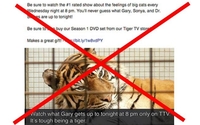Facebook Changes Stripes Once Again, Organic Brand Posts Now Endangered
- by Joe Mandese @mp_joemandese, November 15, 2014
 Facebook late Friday announced yet another push to reduce the number of organic brand posts it says are cluttering its users’ newsfeeds. In an update to its “volume and content controls
for promotional posts” taking effect in January 2015, Facebook said it will further limit the number of promotions posted organically by brands to the users who liked them.
Facebook late Friday announced yet another push to reduce the number of organic brand posts it says are cluttering its users’ newsfeeds. In an update to its “volume and content controls
for promotional posts” taking effect in January 2015, Facebook said it will further limit the number of promotions posted organically by brands to the users who liked them.
Facebook did not disclose the magnitude of the new controls, but said they would affect organic posts that “feel too promotional,” and cited three specific criteria:
1 - Posts that solely push people to buy a product or install an app.
2 - Posts that push people to enter promotions and sweepstakes with no real context.
3 - Posts that reuse the exact same content from ads.
advertisement
advertisement
The move likely will come as a blow to brands that have invested heavily in promoting their Facebook presence to consumers in an effort to get them to like them and to follow their brand content newsfeeds. Already industry executives had been monitoring the percentage of organic brand posts passing through Facebook’s so-called EdgeRank algorithm, a mathematical formula that helps Facebook determine how many and what kind of posts to come through users’ newsfeeds.
Facebook utilizes the algorithm to ensure that users are not overwhelmed with extraneous clutter from irrelevant or marginal posts, but executives who have been monitoring the performance of the algorithm have said in recent months it had fallen to low single-digit percentage reach for brands posting to Facebook users following or liking them.
Those moves, as well as the new update are likely to be a boon for Facebook -- forcing many brands to shift from organic to paid strategies -- because the only way for them to effectively reach consumers on Facebook will be through advertising. But even that is heavily gated by Facebook.
Facebook said the update is being made in response to research it conducted among its users, which it described as “part of an ongoing survey” involving “hundreds of thousands of people."

Facebook did not disclose explicit guidelines for what constitutes overly promotional posts, but showed two examples (the Tiger Therapy one above and the Bunny Puzzle Cube one below) and warned that “pages that post promotional creative should expect their organic distribution to fall significantly over time.”
As part of the announcement, Facebook also reminded brand marketers they can always utilize a paid option for reaching Facebook fans.
“For targeting specific audiences with predictable reach, Facebook advertising offers ways to achieve specific business objectives, like driving in-store sales or app downloads,” it said.A smattering of comments posted by business users on the Facebook For Business news post were generally positive, but at least one raised an important question not just for business posters, but for business newsfeed readers.
“I follow a lot of local business pages for article shares and news,” commented Michael Parnell, manager at North Highland, adding: “Does this mean their articles won't reach my news feed and I'll now be forced to see even MORE pictures of babies and children from my friends, unless those businesses pay to reach me, even if I like them??”



The act of liking something should act as an opt-in for this sort of thing, but at the same time Facebook should severely limit the practice of compensating likes by making offers like-dependent and other similar practices.
An "organic brand post" is a contradiction in terms.
@Stephen Baldwin: But not in search? Just in social?
This is absoutely inevitable, not just from the perspective of Facebook's business strategy, but from a feasibility point of view.
Several facts:
1) People have limited time to look at Facebook.
2) People accrues likes of more pages over time rarely going back to unlike something.
This means that over time more organic posts are competing for the same finite time window in a user's day. So some organic posts have to be dropped from the feed. Facebook is the arbiter of who loses.
Disney closes its theme parks when they become too crowded to allow those already there to have a good time. The same is true for Facebook: Too many ads spoil the experience. As for paid placement, my AdBlock Plus eliminates Facebook ads.
Joe, in search, Google and Bing have position at their disposal, so while Organic hasn't been banished, it's certainly not what it once was. Paid listings, i particular relevant paid listings have been given premier placement. Facebook more-so than Google needs to keep its fickle audience happy while also maximizing revenue. Removing nearly all organic brand posts is an easy way to do that. A "like" is now worth only as much as a "permission cookie" now. It's your opportunity to pay once again as a brand to engage your audience. I feel sorry for the huge brands that worked so hard to build likes, running FB URLs in the billboards and TV advertising, not to mention digital media. Now all they have is a huge "asset" where they have to pay FB a toll every time they want to communicate.
Thank you for explaining that, Kevin. I had a feeling it was something like that. Apologies for being a skeptical journalist. I thought the primary reason Facebook has been migrating brands to more of a paid model was economics, but I'm sure you're right that it's primarily because of its users experiences. But if that's the case, why not get rid of ads altogether or give users the ability to decide if and when they want them? As Doug Ferguson notes above, some users already decide that for themselves.
I can't help but think of this as a golf course. It was free at first so all the big hitters got the best clubs and took out lockers at the course.... only now the golf course owner has put padlocks on the lockers and those keen golfers have to pay every time they want to borrow the key to unlock their own clubs.
This will have zero impact on brands are creating great content, engaging with their users, telling interesting stories, or posting about new products, etc. This will impact those that make many posts, every day, trying to sell something; either the same thing or something very similar (again and again).
You see the start of the FB downfall here. Though couched in more genial terms this move is designed to force marketers to spend more money to promote their messaging. With FB forcing brands to spend more money to promote their messages, the benefits of the natural FB ecosystem retreat. With the switch to paid traffic any brand with thoughtful management will direct its paid traffic outside the FB.com sandbox to their own properties where they can better control all aspects of the presentation and message. This change, in turn, will reduce the commercial traffic and dynamic content development within FB.